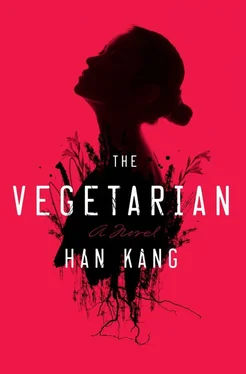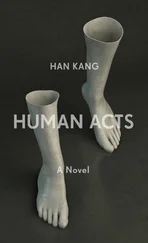“I’ve got an appointment to see Dr. Park In-ho.”
The receptionist greets her, recognizing her from previous visits. She closes her dripping umbrella and secures the tie around it, then sits down on a long wooden bench. While she waits for the doctor to come down from the consultation room, she turns to look at the zelkova tree that stands in the hospital’s front garden. The tree is clearly very old, easily four hundred years. On bright days it would spread its countless branches and let the sunlight scintillate its leaves, seemingly communicating something to her. Today, a day sodden and stupefied with rain, it is reticent, and keeps its thoughts unspoken. The old bark on its lower part is dark as a drenched evening, and the leaves tremble silently on the twigs as the raindrops batter down on them. And she sees her sister’s face, flickering like a ghostly afterimage overlaid on the silent scene.
She closes her bloodshot eyes for a long time before opening them again. The tree fills her field of vision, still silent, keeping its own counsel. Still she cannot sleep. It’s been three months straight now, three months of getting by snatching pockets of sleep here and there, never more than an hour at any one time. Yeong-hye’s voice, the forest with the black rain falling, and her own face with the blood trickling from her eye, shiver the long night into fragments like potsherds.
Usually, when she has given up on trying to wring any more sleep out of the night, it is around three in the morning. She washes her face, brushes her teeth, prepares some side dishes, cleans and tidies every corner of the house, and still the clock goes as slow as ever, the shifting of the hands like the almost comically suspended movements of some ponderous dance. In the end she goes into his room and listens to some of the records he left behind, or puts her hand on her back and spins herself around the room as he once had, or curls up in the bathtub with her clothes on and even feels, for the first time, as though he mightn’t have been so incomprehensible after all. He probably just hadn’t had the energy to take his clothes off, simple as that. He simply can’t have had the energy to adjust the water temperature and take a shower. It struck her that this narrow, concave space was, oddly enough, cozier than anywhere else in the entire apartment.
“When did all of this begin?” she sometimes asked herself in such moments. “No — when did it all begin to fall apart?”
Yeong-hye’s increasingly odd behavior had become noticeable around three years ago, when she’d suddenly decided to turn vegetarian. She lost so much weight it was quite shocking to look at her, and she practically stopped sleeping altogether. Yes, she’d always been quiet, but at that time she would say so little that any kind of meaningful communication was impossible. The whole family had been extremely concerned, their parents in particular. All this had happened shortly after In-hye and her husband had moved with Ji-woo to a new apartment. At the housewarming, when the whole family had got together, their father had struck Yeong-hye in the face, held her mouth open and forced a lump of meat inside. In-hye’s body had jerked violently, as though she herself were the one receiving the blow. She’d stood and watched, stiff as a ramrod, while Yeong-hye howled like an animal and spat out the meat, then picked up the fruit knife and slit her own wrist.
Wasn’t there something she could have done to prevent it? Again and again, doubts raced through her mind. Was there really nothing she could have done to stop their father’s hand that day? Or to get the knife out of Yeong-hye’s hand before she had time to hurt herself? Couldn’t she have prevented her husband from being the one to pick up the bleeding Yeong-hye and rush her to hospital? And then, once Yeong-hye had been admitted to the psychiatric hospital, surely she could have dissuaded her husband, Mr. Cheong, from coldly casting her aside? Above all, that terrible thing that her own husband had done to Yeong-hye, that thing she wanted to put as far from her mind as possible, couldn’t she have talked him out of it, found a way to make him change his mind before the whole thing descended into a cheap, tawdry scandal? The lives of all the people around her had tumbled down like a house of cards — was there really nothing else she could have done?
Of course, there’d been no way for her to guess what ideas her casual mention of that small, blue Mongolian mark would spark in her husband. But shouldn’t she have been able to at least make a guess as to the way things were heading — hadn’t his recent behavior given her sufficient clues? Could she have found a way to impress on him that Yeong-hye was still on medication, was still ill? The only thing clear to her was that what her husband had done was unforgivable.
It wasn’t until past noon that first her husband and then Yeong-hye had awakened, followed quickly by the three paramedics rushing into the flat, concealing straitjackets and protective equipment. Two of them had immediately gone over to Yeong-hye, who had been leaning precariously out over the veranda railing. She resisted violently as they tried to slip the straitjacket on over her naked, paint-mottled body, biting their arms savagely and letting out an incomprehensible roar. Despite her struggles, they managed to insert an IV needle into her forearm. While all this was going on, her husband had tried to get around the other paramedic, who was standing by the front door, but the man easily caught hold of him. Using all his strength to tear himself free, he whipped around and, without a moment’s pause, ran out onto the veranda. He tried to throw himself over the railing. The quick-footed paramedic got hold of him around the waist just in time, and after that he didn’t struggle anymore.
She had stood there, trembling from head to foot, as she watched all this unfold. Eventually, when her husband was being dragged away and their eyes met, she stared at him as hard as she could. But what she saw in his eyes was neither lust nor insanity, regret nor resentment. There was nothing there except the same terror she herself was feeling.
And that was how it all ended. That afternoon, which marked the point after which their lives could never go back to the way they’d been before.
Her husband had been held in a police cell after the hospital confirmed that he wasn’t mentally ill. It took several months of tedious lawsuits and official inquiries before he was released, after which he went immediately into hiding — she never saw him again. But Yeong-hye’s condition was such that she had to remain in the closed ward. After her initial bout of mental illness she’d returned to the stage where she was able to speak to others, only to now withdraw into silence once more. But it wasn’t simply that she didn’t engage in conversation; back in the closed ward, she’d taken to squatting down in a sunny spot where she wouldn’t be disturbed and muttering incessantly to herself. As before, she refused to eat meat, and if she so much as set eyes on a side dish containing meat she would scream and try to run away. On sunny days she would press herself up against the window, unbutton her hospital gown and bare her breasts to the sun. Their parents, whom the whole sorry saga seemed to have greatly aged, didn’t make any further effort to visit Yeong-hye, and even severed contact with their elder daughter, In-hye, who reminded them of the despicable way they’d treated Yeong-hye. The two sisters’ younger brother, Yeong-ho, and his wife were no different. But she, In-hye, could not bring herself to abandon Yeong-hye. Someone had to pay the hospital fees, someone had to act as her carer.
And she got by, as she always had done. Despite the scandal hanging over her, steadfastly refusing to disappear, she made sure that the shop kept running. Time was a wave, almost cruel in its relentlessness as it whisked her life downstream, a life she had to constantly strain to keep from breaking apart. Ji-woo, who had been five that autumn, was now six, and Yeong-hye, who had been transferred to a hospital where the environment was good and the fees were reasonable, looked to have greatly improved.
Читать дальше












